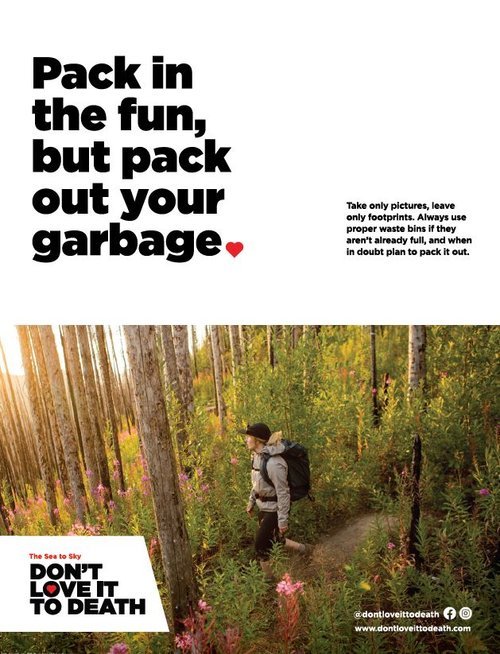The Future of Recreation: A force for good
Could a regenerative travel mindset help make recreation in B.C. more sustainable?
From access to nature to apps and AI, the evolution of trail construction to electric power, this story is part of a series of articles looking at how recreation will change and evolve over the short and long term.
“Don’t love it to death.” It is a rallying cry echoing across B.C. that translates to a realization that the way we attract visitors and steer their behaviour needs to change. In the Sea to Sky Region the call for a paradigm shift is literal.
Stretching from North Vancouver, through the outdoor hubs of Squamish, Whistler and Pemberton, over the Duffey Lake area and down to Lillooet, the Sea to Sky is probably the busiest recreation corridor in the province. A fast-growing population and increased visitation grew traffic on the Sea to Sky Highway by five percent a year every year since 2006. All the people leave more garbage behind: highway contractors had to increase the frequency of their litter clean-ups from weekly to daily. Litter attracted bears and other animals, increasing human-wildlife conflicts. Trailhead parking lots overflowed. Human waste became an issue at some trails and parks. Indigenous cultural sites were damaged. Trespassing became an issue. And search and rescue crews responded to record numbers of callouts, year after year.
To address the growing impacts, communities in the region, BC Parks, the Ministry of Jobs, Economic Recovery and Innovation, the Ministry of Forests and the Indigenous Tourism Association of B.C. created the Sea-to-Sky Destination Management Council. In the summer of 2022, the council launched the Don’t Love It To Death awareness campaign.
“[It] is designed to get people to think about their actions and the impact they're having on the environment, wildlife and the people around them," said Karen Goodwin, vice president, destination and market development for Tourism Whistler.
It is also an acknowledgement that the residents of the Sea to Sky are questioning the longstanding tourist town attitude of blindly embracing tourists because of the economic benefits they bring, while ignoring their negative impacts. The shift is happening across the province, the country and around the world as a growing number of communities are rebalancing the relationship between visitors, residents and the environment. It’s the latest trend in the tourism industry – known as regenerative travel – and recreation infrastructure is at the heart of it.
The concept emerged as travel became more popular – it increased worldwide from 1-billion travellers in 2010 to 1.5-billion in 2019, according to the United Nations – and overcrowding and over-tourism became buzzwords.
“It’s both travellers realizing this is not the experience they were expecting and residents feeling that there are more negatives from all the tourists than positives,” says Eugene Thomlinson, the director of the School of Tourism and Hospitality Management at Royal Roads University in Victoria.
The pandemic put more strain on outdoor recreation infrastructure and prompted a reassessment of priorities.
“Regenerative tourism thinks of the whole destination as this organism,” says Thomlinson. “How do we get all of these different parts of the organism to work together to really manage what the tourists are doing, where they're going, how they're behaving, all of these sorts of things. And really working with all of the players to ensure that the benefits are actually sticking around to protect the environment, create social change, and improve the lives of residents.”
A shift to regenerative thinking could have important implications for recreation in B.C. The provincial government promotes the province as a recreation destination. But residents had little say in how a region was promoted or what the visitors did when they visited. There are not always direct mechanisms for steering the money visiting mountain bikers, hikers, sledders or anglers spent to go back into maintenance of trails, beach clean-ups, or funding volunteer stream keeper groups.
Developing ways of considering community sentiment and reinvesting tourism benefits is why Tourism Vancouver Island changed its name to 4VI, says Anthony Everett, the CEO and president of the marketing organization turned social enterprise.
“We have been spending millions telling people to come to Vancouver Island and then complaining when there wasn't enough staff at the restaurant or the trails were too busy,” Everett says. “We wanted to be responsible for what we were doing.”
Since the name and mission change in 2022, the not-for-profit has shifted its budget focus from promoting the region to steering visitor behaviour and improving community infrastructure. They’ve invested in mountain bike trails in Cumberland and Ucluelet and new composting toilets at a Recreation Sites and Trails BC site near Port Alice. Reconciliation with Indigenous people is key to the change, says Everett, so they’re funding trail enhancements and guardian programs in Nuu-chat-nulth First Nation’s traditional territory on the west coast.
In the future, he imagines starting social impact businesses. Say building and running a motel in an underserved region or owning a brewery or coffee shop whose profits fund affordable housing projects or hiking trails.
What the projects all share is benefits for residents. When they’re happy, visitors will be too, says Everett.
“The key word is balance,” he says.
That’s the same attitude in the Sea to Sky. The “Don’t Love It To Death” campaign features catchy posters and social media posts with a fun but educational message. One said, “Pack in the fun, but pack out your garbage.” Another urged, “When nature calls, know how to go the right way” with a picture of a trowel with toilet paper.
Importantly, the messaging is aimed at locals as well as visitors. That’s one of the elements that separates regenerative from the sustainable and eco-travel trends that preceded it. It recognizes that as soon as we leave our house we are travellers. What we experience while we’re away, whether it’s across town or a remote mountain range, can only be a source for good when we act like a good guest when we’re away and at home.
"We sometimes get too focused on our outdoor pursuits that we forget the importance of how to protect nature and respect the needs of other visitors and the local community,” says Karen Elliott, the mayor of the district of Squamish. “We should all be aware of how our behaviour impacts our environment as visitors, and as locals."
Ryan Stuart started writing about his adventures as a way to get paid to play. Twenty years later he’s still at it. Look for his name in magazines like Outside, Men’s Journal, Ski Canada, online at Hakai and The Narwhal. When he’s not typing at his home office in Vancouver Island’s Comox Valley, you can find him skiing, hiking, mountain biking, surfing, paddling or fishing somewhere nearby.

